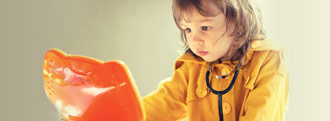Our Health Library information does not replace the advice of a doctor. Please be advised that this information is made available to assist our patients to learn more about their health. Our providers may not see and/or treat all topics found herein.
Topic Contents
Nail-Biting
Overview
Nail-biting (onychophagia) is a common stress-relieving habit. You may bite your nails in times of stress or excitement, or in times of boredom or inactivity. It can also be a learned behavior from family members. Nail-biting is common. So are other habits like thumb-sucking, nose-picking, hair-twisting or -pulling, tooth-grinding, and picking at skin.
You may bite your nails without realizing you are doing it. You might be involved in another activity, such as reading, watching television, or talking on the phone, and bite your nails without thinking about it.
Nail-biting includes biting the cuticle and soft tissue surrounding the nail as well as biting the nail itself.
Who bites their nails?
People of all ages bite their nails. Many adults and children bite their nails at least once in a while. Some people bite their nails often enough to cause problems, like feeling ashamed. Some people have trouble stopping.
Nail-biting may occur with other body-focused repetitive behaviors (BFRB) such as hair-pulling or skin-picking.
What treatments are available for nail-biting?
Several treatment measures may help you stop biting your nails. Some focus on behavior changes and some focus on physical barriers to nail-biting.
- Ask your doctor if there are medicines you can try. They help some people.
- Keep your nails trimmed and filed. Keep your cuticles moisturized. Short, smooth nails and soft cuticles make it less tempting to bite your nails.
- Have a manicure regularly or use nail polish. A clear polish is less noticeable. Wearing artificial nails may stop you from biting your nails and protect them as they grow out. Taking care of your nails can help reduce your nail-biting habit and encourage you to keep your nails attractive.
- Try stress-management techniques if you bite your nails because you are anxious or stressed.
- Paint a bitter-tasting polish on your nails. The awful taste will remind you to stop every time you start to bite your nails.
- Try substituting another activity, such as clenching your fist or squeezing a stress ball, when you find yourself biting your nails. If you keep a record of nail-biting, you will become more aware of the times when you bite your nails and be able to stop the habit.
- Wear gloves, adhesive bandages, or colored stickers whenever possible to remind you not to bite your nails.
- Wear a wrist band to remind you not to bite your nails. When you see the band, you'll remember that you are trying to stop the habit.
What problems can develop from nail-biting?
Nail-biting can cause your fingertips to be red and sore and your cuticles to bleed. Nail-biting also increases your risk for infections around your nail beds and in your mouth.
Long-term nail-biting can also interfere with normal nail growth and cause deformed nails.
In rare cases, nail-biting may be a symptom of obsessive-compulsive disorder (OCD). OCD symptoms are usually treated with medicines.
Related Information
Credits
Current as of: October 3, 2025
Author: Ignite Healthwise, LLC Staff
Clinical Review Board
All Ignite Healthwise, LLC education is reviewed by a team that includes physicians, nurses, advanced practitioners, registered dieticians, and other healthcare professionals.
Current as of: October 3, 2025
Author: Ignite Healthwise, LLC Staff
Clinical Review Board
All Ignite Healthwise, LLC education is reviewed by a team that includes physicians, nurses, advanced practitioners, registered dieticians, and other healthcare professionals.
This information does not replace the advice of a doctor. Ignite Healthwise, LLC disclaims any warranty or liability for your use of this information. Your use of this information means that you agree to the Terms of Use and Privacy Policy. Learn how we develop our content.
To learn more about Ignite Healthwise, LLC, visit webmdignite.com.
© 2024-2025 Ignite Healthwise, LLC.






